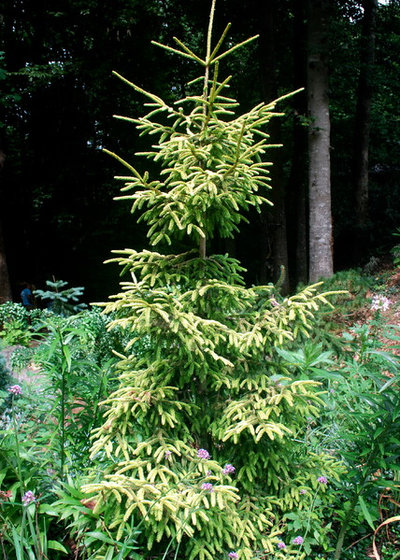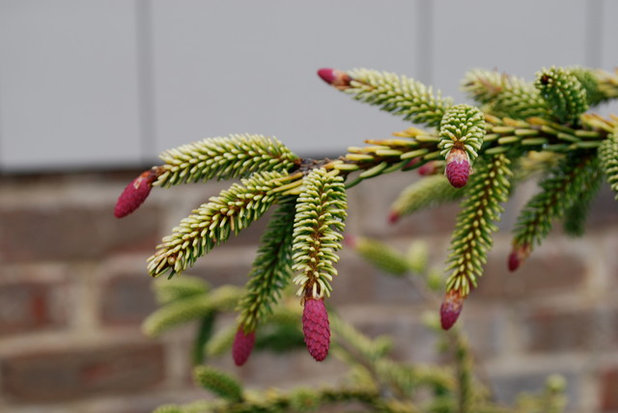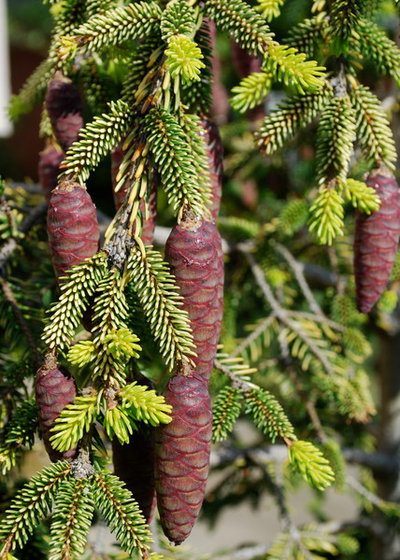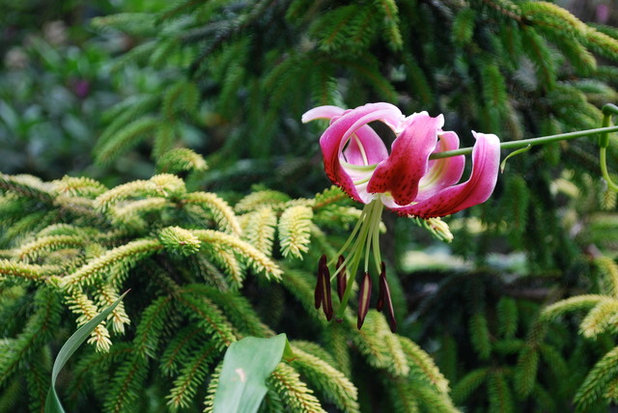Conifer addiction can be a terrible thing. Just ask anyone who knows me. Visitors to my garden frequently ask me which of my 100 conifers is my favorite. Without hesitation, I answer the Skylands Oriental spruce.
It has beautiful chartreuse foliage that visually cools a garden on a hot summer day and brightens up a sleeping winter garden. It also sports colorful cones and keeps to a manageable size. What’s not to love? It grows well with morning sun and afternoon shade, very important to those of us who have woodland gardens. Finally, your neighbors will most likely not have one. Let’s take a look.

Jay Sifford Garden Design
Botanical name: Picea orientalis ‘Skylands’
Common name: Skylands Oriental spruce
Where it will grow: Hardy to -30 degrees Fahrenheit (USDA zones 4 to 8a; find your zone)
Water requirement: Medium, well-drained soil (1 inch of water per week)
Light requirement: Full sun to morning sun/afternoon shade in warmer climates
Mature size: 30 feet high and 10 feet wide, growing 4 to 6 inches per year once established
Benefits and tolerances: Well suited to smaller spaces; some drought tolerance once established; additionally, it offers a good nesting spot for birds
Seasonal interest: Year-round chartreuse foliage; colorful cones; great structure for the winter garden

Jay Sifford Garden Design
Distinguishing traits. Skylands spruce is a smaller cultivar of the Oriental spruce that is a native of the Caucasus and Turkey. While the species can grow to 70 feet in height, Skylands achieves less than half this size, making it suitable for planting in most gardens. This cultivar was introduced by Skylands Botanical Garden in New Jersey in 1979.
The evergreen foliage remains a chartreuse color throughout the year but is especially brilliant in spring when the new growth emerges.

Jay Sifford Garden Design
Like many other spruces, Skylands produces colorful cones in spring and early summer. The small pollen cones emerge first, sporting a brilliant pink color. The seed cones develop later; they are cylindrical in shape and brown in color but with a distinct purple cast.

Jay Sifford Garden Design
How to use it. Skylands spruce, with its tidy conical shape and chartreuse coloration, makes a beautiful focal point, especially in a partially shaded garden that needs a lively jolt of color and interest. Consider planting it with pink to burgundy flowers such as coneflowers (
Echinacea spp and cvs
, zones 3 to 9) or, as shown here, the Black Beauty Oriental lily (
Lilium ‘Black Beauty’, zones 3 to 8). Suitable companion shrubs include Chinese fringe flower
(
Loropetalum chinense cvs, zones 7 to 9) and
rose glow Japanese barberry (
Berberis thunbergii ‘Rose Glow’, zones 4 to 8).
To accentuate its shape and structure, create contrast by planting it behind a triptych of round boxwood (
Buxus cvs,
zones 4 to 8) or
dragon prince Japanese cedars (
Cryptomeria japonica ‘Dragon Prince’, zones 6 to 9).
Planting notes. Skylands spruce may be planted in either spring or fall; winter is acceptable in warmer areas. Average, well-drained soil is preferred. Water weekly (1 inch per week) until the tree is well established. Plant it in an area that offers some afternoon shade in all but the northernmost parts of its range.
See more great plants with bright chartreuse foliage





